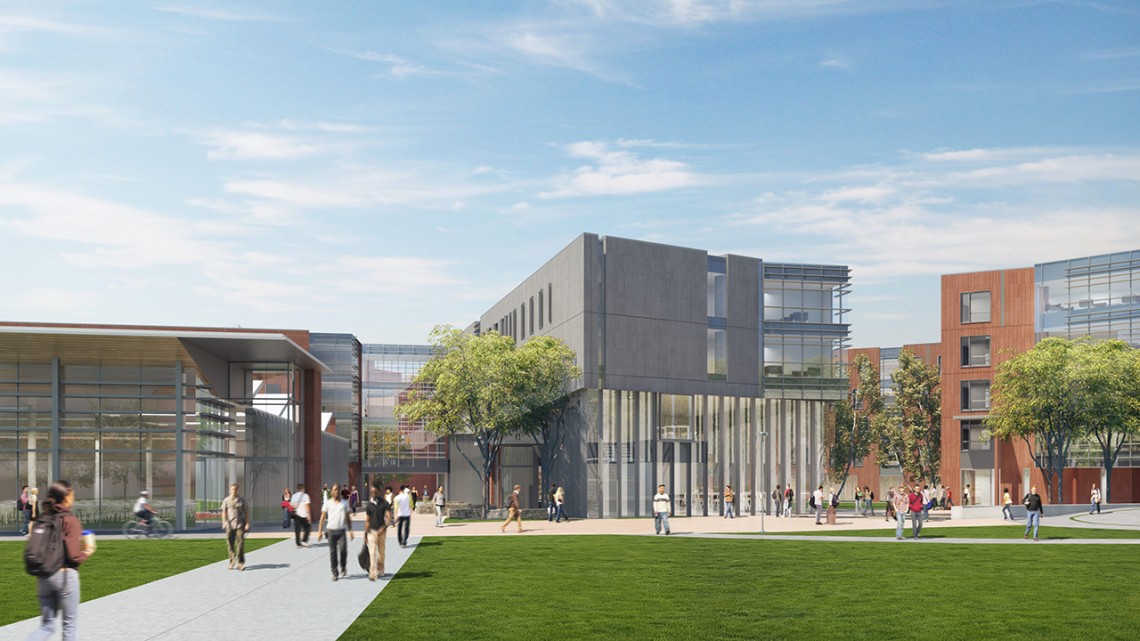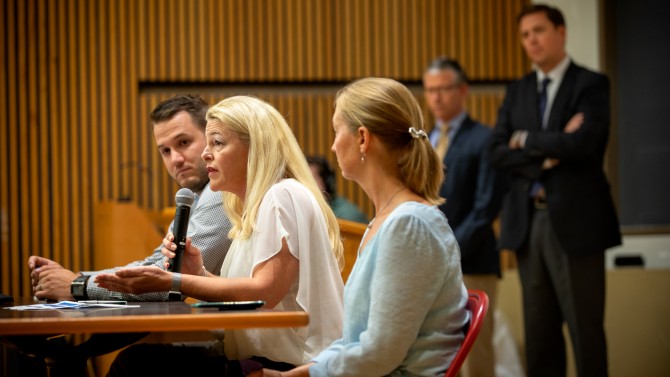
The North Campus Residential Expansion will add approximately 2,000 student beds, plus dining facilities and recreation spaces, to North Campus. Above, a rendering of part of the North Campus Residential Expansion that will house second-year students when the entire project is complete.
North Campus expansion forum provides update
By Joe Wilensky
Cornell administrators and project leaders gave updates and took questions Aug. 15 on the university’s North Campus Residential Expansion (NCRE), which received final site plan approval in late June.
The NCRE will add approximately 2,000 student beds, plus dining facilities and recreation spaces, to North Campus. The plan ultimately will give Cornell the ability to house all first-year students in campus housing designed for the first-year residential experience and all sophomore students in campus residence halls, co-ops and other affiliated housing.
The forum – hosted by Ryan Lombardi, vice president for student and campus life, and Rick Burgess, vice president for facilities and campus services – was the latest in a series of forums offered on the NCRE project. It was open to all faculty and staff and was livestreamed. Approximately 70 people attended in person and more than 50 watched the livestream.
The NCRE received municipal approvals from the city of Ithaca in June. Site preparation work on the first of the two North Campus construction sites has begun; Cornell hopes to complete the first phase, which will accommodate about 800 students, for occupancy in the fall 2021 semester; the second phase, which will accommodate about 1,200 students, is slated for occupancy in the fall 2022 semester.
In total, the project will add approximately 737,000 gross square feet of residential, dining and recreation space.
Burgess and Lombardi gave a quick overview of the NCRE, which they described as “transformative” and designed to dramatically improve the student experience at Cornell.
Currently, because of a shortage of on-campus housing capacity, it is typical for first-year students to have to begin searching for their second-year housing just a month into their Cornell experience, Lombardi said.
“These students have barely figured out how to get to class … and they already have to begin making plans for their second year,” Lombardi said, adding the university wants to “be able to alleviate that pressure on our students, and relieve some of the pressure we put on the community.”
Lombardi and Burgess were then joined by three other project leaders – Bridgette Brady, senior director for Transportation and Delivery Services; Chris Davenport, project manager with Facilities and Campus Services; and Sarah Zemanick, director of the Campus Sustainability Office – to answer submitted inquiries and questions from the audience.
Answers and information they offered included:
• Impact of ongoing construction noise and other disruption to students in existing North Campus residence halls will be mitigated as the semester starts: Weekday start times will move from 6 a.m. to 7:30 a.m., and a 4-5 p.m. finish; Saturday work will be authorized only as needed; and mandatory quiet and stand-down dates, such as during finals week, will be implemented.
• Primary pedestrian pathways from sites such as A Lot to Helen Newman Hall will remain open for the majority of the project, with occasional detours as necessary. Alternate routes from Hasbrouck to Helen Newman Hall are being explored. Appel Lot will come back online eventually for those parking for Helen Newman Hall.
• If A Lot is full, Hasbrouck is a backup lot for permit holders. A Lot use has been monitored since the closure of CC Lot, and although fuller than usual, Brady said, there have been spaces still available.
• Solar panels on the new buildings’ rooftops are expected to offset the project’s electric load by up to 35 percent, Zemanick said; the new construction fits into the university’s goal to become carbon neutral by 2035.
• The project is being funded through debt financing, Lombardi said; he noted that revenue generated from the room rate fees students pay in the new facilities will cover the full cost of the project. The new rooms will be offered at the same price point as existing residential space on campus.
• Project leaders are working with TCAT and CULift to keep North Campus accessible during and after construction, to keep bus routes and other alternate transportation methods as efficient as possible for North Campus residents and to keep pedestrians safe.
• Ongoing communications from administrators and project leaders to the campus community – especially to those communities immediately adjacent to the construction sites – will be increased. “Communication over these next couple of years is going to be critical,” Lombardi said, noting he will prioritize two-way communication, not just information pushed out to the community. “This is a big, evolving and continuous project.”
• The increased housing on North Campus will also accommodate the modest student enrollment increases that have been happening for the past several years, Lombardi said, and will allow for a slight continued increase, though he said that a cap of 15,800 undergraduates has now been set as the limit of that increase. Total undergraduate enrollment was approximately 15,100 last fall.
For more information, visit the project website, where you also can subscribe to the NCRE mailing list; or email ncre@cornell.edu.
Media Contact
Get Cornell news delivered right to your inbox.
Subscribe


